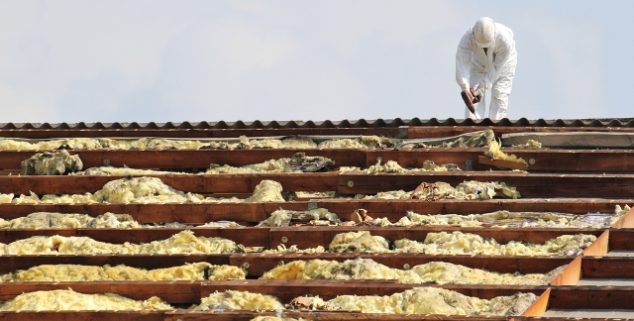Opinion
Gaming the system in asbestos lawsuits
 A worker removes asbestos-laden material from a building roof. (Photo: Bjoern Wylezich)
A worker removes asbestos-laden material from a building roof. (Photo: Bjoern Wylezich)California is renowned for trailblazing some of the nation’s most stringent transparency and disclosure laws. We have the Brown Act, which requires local governments to be transparent about meetings and actions. In many cases, governmental worker and salary history is published. We have transparency in supply chains, designed to help root out human trafficking. In general, California can truly be called the Sunshine State.
Except in relation to asbestos lawsuits. Eight other states have passed important legislation regarding Asbestos Trust Transparency. California needs to do the same.
The companies that went bankrupt put their remaining money in a Federal Bankruptcy trust, designed to cover future payouts for future claimants.
Asbestos refers to a group of six natural and versatile minerals that were once widely used in fireproofing, insulation, and many other industrial uses. Its usage was later banned when it was discovered that asbestos’ properties are highly toxic, and that regular exposure can lead to mesothelioma and lung cancer.
Workers exposed to asbestos who later get sick have an opportunity to seek legal compensation for their harm in two ways. First, they can use the state court system to sue the company or companies who made the asbestos that made them sick. But since many asbestos companies went bankrupt as a result of lawsuits over asbestos exposure, there is also a second way to seek compensation via a federal bankruptcy trust. The companies that went bankrupt put their remaining money in a Federal Bankruptcy trust, designed to cover future payouts for future claimants.
Both pathways exist to ensure injured claimants receive compensation for their injuries as a result of exposure to asbestos products. However, some lawyers are gaming the system. First, the lawyer sues the solvent company and receives a full recovery after trial or settlement. Then, the lawyer files a claim before the bankruptcy trust for the same exact harm. Of course, it’s entirely possible the plaintiff was exposed to multiple different brands of asbestos. If that’s the case, then the trust should know about exposure to other asbestos from solvent companies. And the judge and jury should know about the exposure to other asbestos from now-bankrupt companies.
Because claims and relevant evidence are confidential in bankruptcy litigation proceedings, plaintiff’s attorneys can misrepresent the facts and deliberately delay filing trust claims. This allows deceptive lawyers to recover from multiple defendants and double their fees. This is wrong for two reasons. One, it’s unethical to lie or omit important information in court. Secondly, it’s wrong to double-dip because such actions will deplete trust resources that are needed for legitimate future victims.
Asbestos litigation is one of the longest-running mass tort litigations in the nation, spanning over 40 years, with hundreds of thousands of claims filed. And there are no signs of slowing. The California Supreme Court recently ruled that employers and premises owners are now legally responsible for “take home” asbestos exposure, which occurs when a worker who is directly exposed to asbestos carries it home on their clothing, and in turn, exposes a household member to the toxin through physical proximity.
The pool of victims is rapidly growing, yet the resources for compensation are finite. Now more than ever, California needs asbestos litigation reform to ensure that asbestos defendants and claimants are protected from these bad actors. California workers, veterans and families who suffer from asbestos exposure deserve to recover their claims from these serious, health‐related lawsuits.
Now is the time for California to join states across the country in enacting meaningful reform on this issue. It is the responsibility of the Legislature to definitively close this loophole that allows some lawyers to take advantage of this opaque system. By adopting a thoughtful approach, focused on disclosure and transparency, we can help ensure that asbestos trust funds are available for all those impacted, not just those who sue first.
—
Ed’s Note: John Doherty is the President and CEO of the Civil Justice Association of California, or CJAC
Want to see more stories like this? Sign up for The Roundup, the free daily newsletter about California politics from the editors of Capitol Weekly. Stay up to date on the news you need to know.
Sign up below, then look for a confirmation email in your inbox.

Leave a Reply